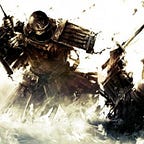Reversing Clausewitz
Deleuze and Guattari’s worldwide War Machine
[It is helpful to have some basic insight into what Deleuze and Guattari mean when they refer to states, war machines and appropriated war machines — there is a decent overview here, and even simpler, obviously less rich, but more concise definitions here.]
Let us compare this hypothesis as a whole with Clausewitz’s formula: “War is a continuation of politics by other means.” As we know, this formula is itself extracted from a theoretical and practical, historic and transhistoric whole (ensemble), the parts of which are interconnected:
1) There is a pure concept of war as absolute, unconditioned war, an Idea not given in experience (bring down or “upset” the enemy, who is assumed to have no other determination, with no political, economic, or social considerations entering in);
2) What is given are real wars submitted to State aims; States are better or worse “conductors” in relation to absolute war, and in any case condition its realization in experience;
3) Real wars oscillate between two poles, both subject to State politics: the war of annihilation, which can escalate to total war (depending on what the objectives of the annihilation are), and tends to approach the unconditioned concept via an ascent to extremes; and limited war, which is no “less” a war, but one that effects a descent towards limiting conditions, and can de-escalate to mere “armed observation.”
In the first place, the distinction between absolute war as an Idea and real wars seem of great importance to us, but only with a different criterion than that of Clausewitz. The pure Idea is not that of the abstract elimination of the adversary, but that of a war machine which does not have war as its object and which only entertains a potential or supplementary synthetic relation with war…
…It is at the same the same time that the State apparatus appropriates the war machine, subordinates it to its “political” aims, and gives it war as its direct object.
It is therefore true that total war remains subordinate to State political aims, and merely realizes the maximal conditions of the appropriation of the war machine by the State apparatus. But it is also true that when total war becomes the object of the appropriated war machine, then at this level of the set of all possible conditions, the object and the aim enter into new relations that can reach the point of contradiction. This explains Clausewitz’s vacillation when he establishes at one point that total war remains a war conditioned by the political aims of states, and at another that it tends to effectuate the Idea of unconditioned war. In effect, the aim remains essentially political and determined by the state, but the object itself had become unlimited.
We could say that the appropriation has changed direction, or rather that States tend to unleash, reconstitute, an immense war machine of which they are no longer anything more than the opposable or supposed parts.
This worldwide war machine, which in a way “reissues” from the States, displays two successive figures: first, that of fascism, which makes war an unlimited movement with no other aim but itself…and the second, post-fascist, figure is that of a war machine that takes peace as its object directly, as the peace of Terror or Survival…Total war is surpassed towards a peace more terrifying still. The war machine has taken charge of the aim, worldwide order, and States are no longer anything more than objects or means adapted to that machine. This is the point at which Clausewitz’s formula is effectively reversed; to be entitled to say that politics is the continuation of war by other means, it is enough to invert the order of the words as if they could be spoken in either direction; it is necessary to follow the real movement at the conclusion of which the States, having appropriated the war machine, and having adapted it to their aims, reissue a war machine that takes charge of the aim, appropriates the states, and assumes increasingly wider functions.
- from 1227 (A.D.): Treatise on Nomadology — The War Machine, A Thousand Plateaus: Capitalism and Schizophrenia, by Gilles Deleuze and Felix Guattari.
-LM
